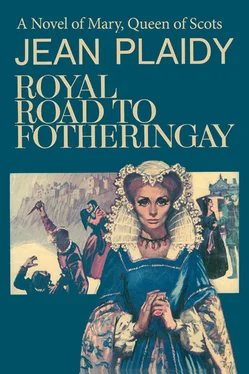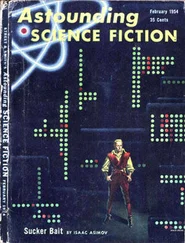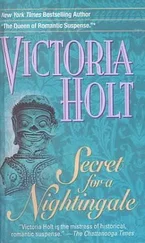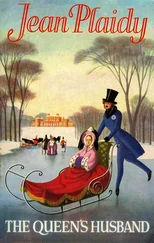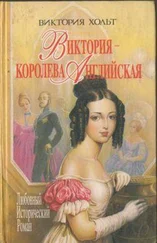He did not know. He wanted to leave Scotland, that was all. He did not now think he would go after all. It was just to make the Queen understand how badly she treated her husband.
“It would be a treasonable act,” said Moray, “to leave Scotland for Spain. For what purpose did you intend to go?”
“To … to bring the Queen back to her duty…. To be received back in her favor….”
“It is hardly the way,” said Maitland suavely, “to win the Queen’s favor—by playing traitor to her.”
“I am not a traitor. I am no traitor!” screamed Darnley.
Mary could bear no more. There was nothing she wanted so much as to be rid of Darnley. She was filled with shame whenever she was forced to look at him.
She said: “If he gives his word not to leave Scotland, we will pardon him… providing he returns to his fathers castle… and stays there.”
Darnley’s face was white with rage, but he trembled with fear as he turned from the watching group and, shouting: “Goodbye, Madam. You shall not see my face for a long time!” He hurried away.
IT WAS OCTOBER and the mist lay thick across the land, when news came of Border fighting near the town of Jedburgh. Bothwell left Court and galloped south at the head of his men.
Mary was desolate. She had begged him to let someone else go, for she could not exist without him; but he had laughed at the idea. The Border was his domain. If there were trouble there, who should be at hand but Bothwell? Then she began to understand the difference in their passion. She realized that she did not mean as much to him as he did to her.
He wanted to ride away. The excitement of battle called him as lust had called him in the room at the Exchequer House.
She was frantic with anxiety and jealousy. He would doubtless call at one of his castles before returning, and he would see his wife. She visualized Jean Gordon—not exactly a comely woman—oval face, sandy hair, and the long Gordon nose; yet it was said that in the early days of his marriage Bothwell had been more faithful to Jean Gordon than to any woman.
But not now, she assured herself. He would come straight back to the Court. He must. Why had she not made him promise not to go to his home? Because one did not, she had also realized, command Bothwell in such matters. She knew that to have asked him not to visit Jean would have put it into his mind to do so. But if he was not the man to make such promises, neither was he the man to deceive her. If he had thought of seeing Jean he would have boldly said so. It was his arrogant and most disconcerting boldness that she loved. These were a symbol of his independence. It showed her clearly that she, the Queen, needed him, more than he needed her.
How long would he stay? Until he wished to return?
Why did I let him go? she asked herself. The answer was: You could do no other. None could hold Bothwell against his wish.
With what joy she discovered that there was an assize at Jedburgh which she should attend! With what joy she set out on the journey!
She had a perfectly reasonable excuse for going to him, for her duties as Queen demanded her presence in Jedburgh. Fate was being good to her at last.
Seton watched her with some anxiety as they set out.
Never, thought Seton, had she looked so beautiful. She had changed since her association with Bothwell; she had become feverishly gay. But would it last? wondered Seton. Bothwell was not the man she would have chosen for Mary. There was no tenderness in him; there was instead a ruthlessness and a primitive appetite. What did he really feel for Mary beyond his lust? There were times when Seton thought she would like to seek the peace of a nunnery because the outside world made her so unhappy.
Meanwhile they rode toward Jedburgh, but before they reached that town the news was brought to them. Mary saw the man as he rode toward them and her heart leaped, for she knew him as one of Bothwell’s men.
“What news?” she cried. “What news?”
“Bad news, Your Majesty.”
Her hand tightened on her reins. “Bothwell?” she gasped.
It seemed as though the man took a long time to answer. “It was John Elliot of the Park… the notorious highwayman, Your Majesty. My lord heard that he was in the neighborhood and went out to get him. The highwayman was wounded, but… not seriously…. He turned on my lord and—”
“And… killed him?” murmured Mary.
Seton was beside her, her gentle eyes pleading: Not here … do not betray yourself here before these people. You loved him…. He was everything to you… but do not betray yourself here before these witnesses.
“So Bothwell is killed,” said Mary blankly. She looked at Seton, pleading for help. I am lost. I care for nothing. I wish it were I who had died.
Seton said: “It is a great shock. Her Majesty has not been well of late. I think we should rest here for a while before continuing our journey.”
Seton escorted her to the chamber which had been prepared for her and lay down beside her on the bed, putting her arms about her; they did not weep; they lay close together while Seton stroked the Queens hair. At length the Queen said: “There is nothing to live for, Seton. I wish that I were dead.”
SHE DID NOT KNOW how she sat through the assize. She supposed she conducted herself with outward calm, for none seemed to realize the tumult within her. The strain was so great that at times she seemed near to fainting. The old gnawing pain was back in her side.
She was lenient as she always was with offenders. She wanted to help all those who suffered. And all the time she was thinking: I wish I were dead instead of him. How I wish it was I who died.
When the assize was over there came a messenger from Bothwell’s Castle of Hermitage. He was not dead, said the messenger, though so seriously wounded that death seemed inevitable. Then she was filled with hope. She would go to him at once. She would make him live. She tried to hide her joy; she said calmly: “He has received his hurt in my service, and I myself must see that all that can be done for his comfort shall be done.”
So she set out from Jedburgh to the Castle of Hermitage, and there she saw him. He was wounded in the thigh, the head and one of his hands; and so severe were these wounds that they would have killed an ordinary man. But he bore them with ease. He lay looking at her, and the old insolent look was in his eyes. They seemed to grin at her below the bandage.
“Thank God you are alive!” cried Mary.
Even as she spoke she fell fainting to the floor. The strain of the last few days had been too much for her. She had sat through the assizes believing her lover dead; she had not been allowed to show her grief because their union was not a regular one, and the need for secrecy had made her burden the harder to bear. And now that she saw him lying very badly wounded, yet still with more vitality than that of ordinary men, now that she knew she might not lose him, the tension snapped. In the days that followed she was as near death as he was.
SHE LAY AT Jedburgh in the house of Lady Fernyhirst whither she had been carried in a litter, and a terrible melancholy filled her.
I love him, she mused, but what am I to him? One of the thousands who have amused him for a while. I, who am a queen, am but a light woman to him.
She had a husband; he had a wife. What hope was there that they could ever marry? Marriage with him was what Mary desired beyond all things. Only that could comfort her and give her peace. She longed to end her adulterous association, but she could only end it by making it legal.
During those days at Jedburgh she believed she was dying. So did Moray. He began helping himself to some of the precious silver in Holyrood. For more than a week she lay close to death. Bothwell was brought to the same house, but although he had been severely wounded, owing to his amazing vitality, there was no doubt after the first days that he would live.
Читать дальше
